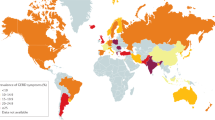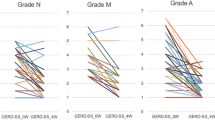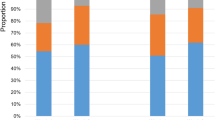Abstract
Gastroesophageal reflux (GER) is the second most common cause of chronic cough in immunocompetent patients who are nonsmokers, not on angiotensin-converting-enzyme inhibitors and have normal chest radiographs. Identification of GER in chronic cough patients can be difficult; most patients with GER-related cough have no esophageal symptoms and no esophageal test is adequate to make this diagnosis. Post-hoc analysis of four prospective intervention trials has identified a clinical patient profile that can predict the presence of GER-related cough 91% of the time. Clinical practice guidelines from the American College of Chest Physicians and the British Thoracic Society recommend initiating an initial empiric GER therapy trial, with esophageal testing being reserved for nonresponders. The empiric trial should include conservative measures and PPIs twice daily for 3 months. Selected patients who have dysphagia might benefit from the addition of a prokinetic agent. Esophageal manometry and pH testing with impedance monitoring (if available) should be performed in nonresponders while they are on therapy. It can take more than 50 days for cough to respond to medical GER therapy. Surgical fundoplication might be helpful in very carefully selected patients. Careful evaluation and treatment resolves cough in ∼80% of patients with GER-related cough.
Key Points
-
There are more than 30 causes of chronic cough (cough lasting for >8 weeks), and more than one cause is present in 8–75% of cases
-
GER is the second most common cause of chronic cough when GER-related cough is defined as a cough that is improved or resolved by GER therapy; nonacid or weakly acidic GER can elicit cough
-
Up to 75% of patients with GER-related cough have no esophageal GER symptoms, but it is still possible to predict the presence of GER-related cough. An empiric trial of conservative measures plus twice-daily PPIs for 3 months can successfully identify and treat GER-related cough in approximately 80% of patients; GER-related cough can take more than 3 months to improve even with aggressive medical GER therapy
-
Esophageal diagnostic testing is recommended if an empiric therapy trial fails and should include esophageal manometry, pH monitoring and impedance monitoring, if available, while maintaining GER therapy
-
Surgical fundoplication can be considered in selected patients who desire surgical therapy and who respond to medical therapy after a comprehensive evaluation, or in patients with documented nonacid reflux who do not respond to medical therapy
This is a preview of subscription content, access via your institution
Access options
Subscribe to this journal
Receive 12 print issues and online access
$209.00 per year
only $17.42 per issue
Buy this article
- Purchase on Springer Link
- Instant access to full article PDF
Prices may be subject to local taxes which are calculated during checkout
Similar content being viewed by others
References
Chang AB et al. Gastro-oesophageal reflux treatment for prolonged non-specific cough in children and adults. Cochrane Database of Systematic Reviews 2006, Issue 4. Art. No.: CD004823. DOI: 10.1002/14651858.CD004823.pub3
Chang AB et al. (2006) Systematic review and meta-analysis of randomized controlled trials of gastro-oesophageal reflux interventions for chronic cough associated with gastro-oesophageal reflux. BMJ 332: 11–17
Irwin RS et al. (2006) Diagnosis and management of cough executive summary: ACCP evidence-based clinical practice guidelines. Chest 129: 1S–23S
Ford AC et al. (2006) Cough in the community: a cross sectional survey and the relationship to gastrointestinal symptoms. Thorax 61: 975–979
Irwin RS et al. (1998) Managing cough as a defense mechanism and as a symptom. A consensus panel report of the American College of Chest Physicians. Chest 114 (2 Suppl): 133S–181S
Palombini BC (1999) A pathogentic triad in chronic cough: asthma, postnasal drip and gastroesophageal reflux disease. Chest 116: 279–284
O'Connell F et al. (1994) Capsaicin cough sensitivity decreases with successful treatment of chronic cough. Am J Respir Crit Care Med 150: 374–380
Kastelik JA (2005) Investigation and management of chronic cough using a probability-based algorithm. Eur Respir J 25: 235–243
Mishimi I et al. (2005) Prevalence of endoscopically positive and negative gastroesophageal reflux disease in Japanese. Scand J Gastroenterol 40: 1005–1009
Heading RC (1999) Prevalence of upper gastrointestinal symptoms in the general population. Scand J Gastroenterol Suppl 231: 3–8
Niimi A (2007) Geography and cough aetiology. Pulm Pharmacol Ther 20: 383–387
Fujimura M et al. (2005) Importance of atopic cough, cough variant asthma and sinobronchial syndrome as causes of chronic cough in the Hokuriku area of Japan. Respirology 10: 201–207
Matsumoto H et al. (2007) Prevalence and clinical manifestations of gastro-esophageal reflux-associated chronic cough in the Japanese population. Cough 3: 1–4
Haque RA et al. (2005) Chronic idiopathic cough: a discrete clinical entity? Chest 127: 1710–1713
Irwin RS et al. (2006) Chronic cough due to gastroesophageal reflux disease: ACCP evidence-based clinical practice guidelines. Chest 129: 80S–94S
Tutuian R et al. (2006) Nonacid reflux in patients with chronic cough on acid-suppressive therapy. Chest 130: 386–391
Sifrim D et al. (2005) Weakly acidic reflux in patients with chronic unexplained cough during 24 hour pressure, pH, and impedance monitoring. Gut 54: 449–454
Irwin RS et al. (1981) Chronic persistent cough in the adult: the spectrum and frequency of causes and successful outcome of specific therapy. Am Rev Respir Dis 123: 413–417
Kiljander TO et al. (2000) Chronic cough and gastro-oesophageal reflux: a double-blind placebo-controlled study with omeprazole. Eur Respir J 16: 633–638
Irwin RS et al. (1993) Chronic cough due to gastroesophageal reflux disease: clinical, diagnostic, and pathogenetic aspects. Chest 104: 1511–1517
Ferrari M et al. (1995) Tussive effect of capsaicin in patients with gastroesophageal reflux without cough. Am J Respir Crit Care Med 151: 557–561
Ing A et al. (1994) Pathogenesis of chronic persistent cough associated with gastroesophageal reflux. Am J Respir Crit Care Med 149: 160–167
DeVault KR et al. (2005) Updated guidelines for the diagnosis and treatment of gastroesophageal reflux disease. Am J Gastroenterol 100: 190–200
Irwin R et al. (2002) Diagnosis and treatment of chronic cough due to gastro-esophageal reflux disease and post nasal drip syndrome. Pulm Pharmacol Ther 15: 261–266
Wunderlich AW et al. (2003) Temporal correlation between chronic cough and gastroesophageal reflux disease. Dig Dis Sci 48: 1050–1056
Morice AH et al. (2006) Recommendations for the management of cough in adults. Thorax 61 (Suppl 1): i1–i24
Pratter MR et al. (2002) An empiric integrative approach to the management of cough. ACCP evidence-based clinical practice guidelines. Chest 129: 222S–231S
Poe RH et al. (2003) Chronic cough and gastroesophageal reflux disease: experience with specific therapy for diagnosis and treatment. Chest 123: 679–684
Irwin RS et al. (1990) Chronic cough. The spectrum and frequency of causes, key components of the diagnostic evaluation, and outcome of specific therapy. Am Rev Respir Dis 141: 640–647
Pratter MR et al. (1993) An algorithmic approach to chronic cough. Ann Intern Med 119: 977–983
Mello CJ et al. (1996) Predictive values of the character, timing, and complications of chronic cough in diagnosing its causes. Arch Intern Med 156: 997–1003
Irwin RS et al. (2002) The persistently troublesome cough. Am J Respir Crit Care Med 165: 1469–1474
Harding SM (2006) Gastroesophageal reflux and chronic cough. In: Goyal and Shaker GI Motility OnLine (Eds Goyal RK and Shaker R) New York: Nature Publishing Group. [http://www.nature.com/gimo/contents/pt1/full/gimo77.html] (accessed 21 March 2007)
Smyrnios NA et al. (1995) Chronic cough with a history of excessive sputum production. The spectrum and frequency of causes, key components of the diagnostic evaluation, and outcome of specific therapy. Chest 108: 991–997
Everett CF et al. (2007) Clinical history in gastroesophageal cough. Resp Med 101: 345–348
McGarvey LP et al. (1998) Evaluation and outcome of patients with chronic non-productive cough using a comprehensive diagnostic protocol. Thorax 53: 738–743
Zerbib F et al. (2006) Esophageal pH-impedance monitoring and symptom analysis in GERD: a study in patients off and on therapy. Am J Gastroenterol 101: 1956–1963
Baldi F et al. (2006) Cost effectiveness of different diagnostic strategies to assess gastroesophageal reflux disease in patients with unexplained chronic persistent cough in Italy. Dig Liver Dis 38: 452–458
Lin L et al. (2001) Empirical treatment of chronic cough—a cost-effective analysis. Proc AMIA Symp 2001: 383–387
Ours TM et al. (1999) A prospective evaluation of esophageal testing and a double-blind, randomized study of omeprazole in a diagnostic and therapeutic algorithm for chronic cough. Am J Gastroenterol 94: 3131–3138
Vaezi MF et al. (1997) Twenty-four hour ambulatory esophageal pH monitoring in the diagnosis of acid reflux-related chronic cough. South Med J 90: 305–311
Morice AH et al. (2007) ERS guidelines on the assessment of cough. Eur Respir J 29: 1256–1276
Howaizi M et al. (2003) Omeprazole-induced intractable cough. Ann Pharmacother 37: 1607–1609
Prilosec® (omeprazole) package insert. (AstraZeneca LP)
Kauer WK et al. (1995) A tailored approach to antireflux surgery. J Thorac Cardiovasc Surg 110: 151–146
Oleynikov D et al. (2002) Total fundoplication is the operation of choice for patients with gastroesophageal reflux and defective peristalsis. Surg Endosc 16: 909–913
Tutuian R et al. (2004) Clarification of esophageal function defect in patients with manometric ineffective esophageal motility: studies using impedance-manometry. Clin Gastroenterol Hepatol 2: 230–236
Fernando HC et al. (2002) Outcomes of laparoscopic Toupet compared to laparoscopic fundoplication. Surg Endosc 16: 905–908
Birring SS et al. (2003) Development of a symptom specific health status measure for patients with chronic cough. Leicester Cough Questionnaire (LCQ). Thorax 58: 339–343
Fontana GA et al. (2004) Reply: Chronic cough and gastroesophageal reflux. Thorax 59: 633–634
Irwin RS et al. (2002) Chronic cough due to gastroesophageal reflux disease: failure to resolve despite total/near total elimination of esophageal acid. Chest 121: 1132–1140
Pellegrini CA et al. (1979) Gastroesophageal reflux and pulmonary aspiration: incidence, functional abnormality, and results of surgical therapy. Surgery 86: 110–119
DeMeester TR et al. (1990) Chronic respiratory symptoms and occult gastroesophageal reflux: a prospective clinical study and results of surgical therapy. Ann Surg 211: 337–345
Giudicelli R et al. (1990) Gastroesophageal reflux and respiratory manifestations: diagnostic approach, therapeutic indications and results. Ann Chir 42: 552–554
Johnson WE et al. (1996) Outcome of respiratory symptoms after anti-reflux surgery on patients with gastroesophageal reflux disease. Arch Surg 131: 489–492
Allen CV et al. (2002) Preoperative symptom evaluation and esophageal acid infusion predict response to laparoscopic Nissen fundoplication in gastroesophageal reflux patients who present with cough. Surg Endosc 16: 1037–1041
So JBY et al. (1998) Outcome of atypical symptoms attributed to gastroesophageal reflux treated by laparoscopic fundoplication. Surgery 124: 28–32
Novitsky YW et al. (2002) Chronic cough due to gastroesophageal reflux disease: efficacy of antireflux surgery. Surg Endosc 16: 567–571
Allen CJ et al. (2004) Does laparoscopic fundoplication provide long-term control of gastroesophageal reflux related cough? Surg Endosc 18: 633–637
Kaufman JA et al. (2006) Long-term outcomes of laparoscopic antireflux surgery for gastroesophageal reflux disease (GERD)-related airway disorder. Surg Endosc 20: 1824–1830
Flum DR et al. (2002) The nationwide frequency of major adverse outcomes in antireflux surgery and the role of surgeon experience, 1992–1997. J Am Coll Surg 195: 611–618
Wolfe MM (2003) Managing gastroesophageal reflux disease: from pharmacology to the clinical arena. Gastroenterol Clin North Am 32 (3 Suppl): S37–S46
Laheij RJ et al. (2004) Risk of community-acquired pneumonia and use of gastric acid-suppressive drugs. JAMA 292: 1955–1960
Yang YX et al. (2006) Long-term proton pump inhibitor therapy and risk of hip fracture. JAMA 296: 2947–2953
Fackler WK et al. (2002) Long-term effect of H2RA therapy on nocturnal gastric acid breakthrough. Gastroenterology 122: 625–632
Gregor J (2004) Acid suppression and pneumonia; a clinical indication for national prescribing. JAMA 292: 2012–2013
Menon MS et al. (2005) Experience with baclofen in cough secondary to gastro-oesophageal disease [abstract]. Proc Am Thorac Soc 2: A323
Bredenoord AJ et al. (2007) Technology review: esophageal impedance monitoring. Am J Gastroenterol 102: 187–194
Physicians' Desk Reference No.61 (2007) Montvale, NJ: Thomson PDR
Scarpignato C et al. (2006) Acid suppressive therapy; where do we go from here? Dig Dis 24: 11–46
Simon WA et al. (2007) Soraprazan: setting new standards in inhibition of gastric acid secretion. J Pharmacol Exp Ther 321: 866–874
Falk GW et al. (2006) AGA Institute technical review on the use of endoscopic therapy for gastroesophageal reflux disease. Gastroenterology 131: 1315–1336
Liu JJ et al. (2006) Endoscopic treatment for atypical manifestations of gastroesophageal reflux disease. Am J Gastroenterol 109: 440–445
Harding SM (2003) Chronic cough: practical considerations. Chest 123: 659–660
Acknowledgements
The authors wish to thank Arren Graf for her outstanding editorial assistance and patience. Désirée Lie, University of California, Irvine, CA, is the author of and is solely responsible for the content of the learning objectives, questions and answers of the Medscape-accredited continuing medical education activity associated with this article.
Author information
Authors and Affiliations
Corresponding author
Ethics declarations
Competing interests
SM Harding serves as a consultant for, and has, in the past, received research support from, AstraZeneca LP. Dr Harding currently receives research support from the National Institutes of Health (NHLBI). KMD Chandra declared no competing interests.
Rights and permissions
About this article
Cite this article
Chandra, K., Harding, S. Therapy Insight: treatment of gastroesophageal reflux in adults with chronic cough. Nat Rev Gastroenterol Hepatol 4, 604–613 (2007). https://doi.org/10.1038/ncpgasthep0955
Received:
Accepted:
Issue Date:
DOI: https://doi.org/10.1038/ncpgasthep0955
This article is cited by
-
Extra-Esophageal Manifestations of Gerd: Who Responds to GERD Therapy?
Current Gastroenterology Reports (2013)
-
Fundoplication in chronic intractable cough
Cough (2012)
-
ENT manifestations of gastroesophageal reflux
Current Allergy and Asthma Reports (2008)



